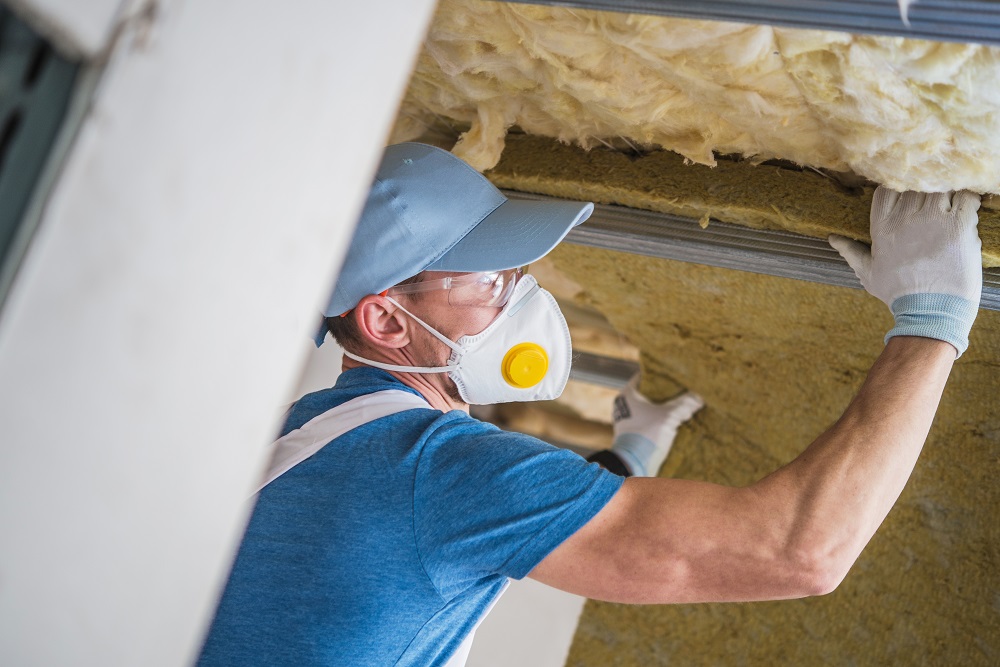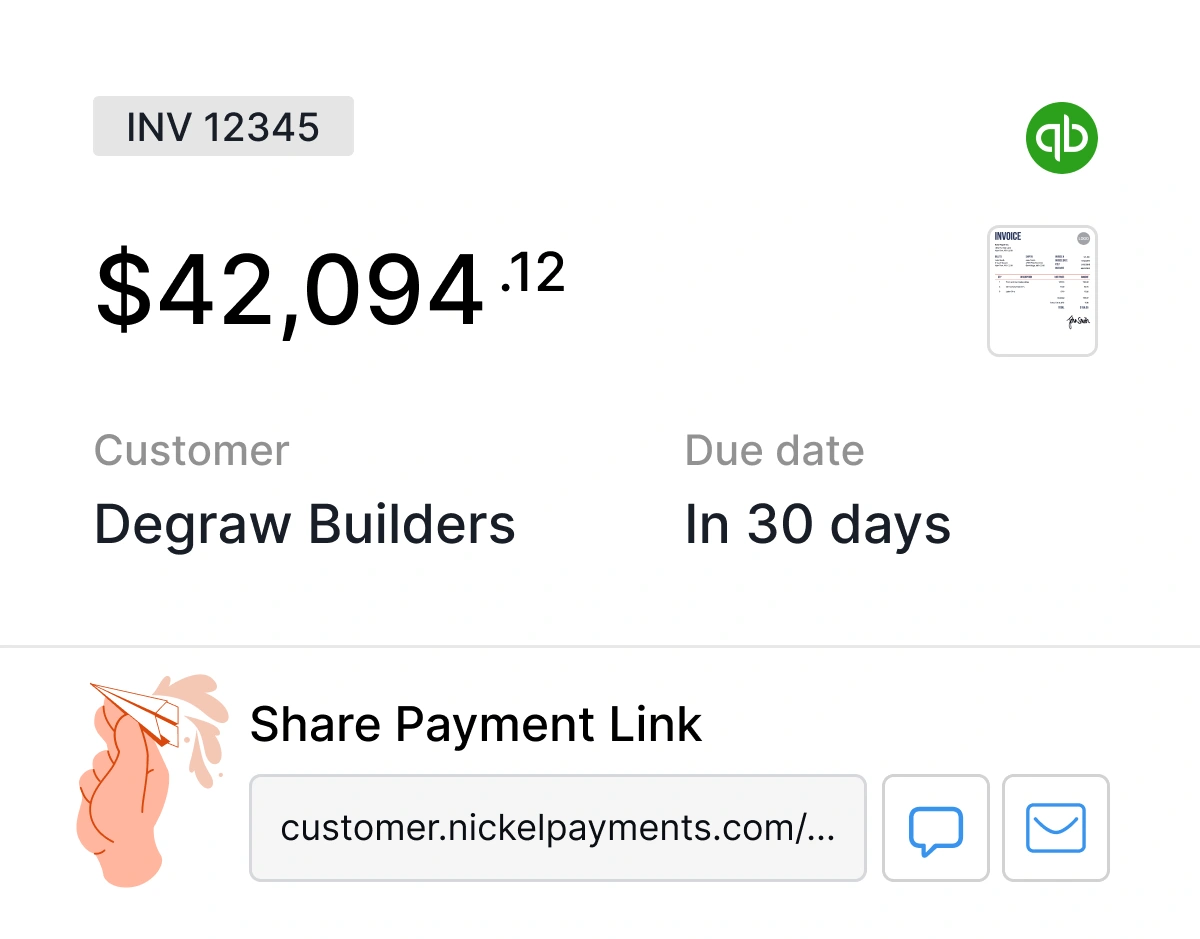The Payment Platform Built for Insulation Contractors
Seal the deal on better cash flow with payments designed for insulation professionals

Trusted by 10,000+ industrial small businesses














































Why Insulation Contractors Are Switching to Nickel
Unlike traditional payment processors that treat you like a "high-risk" business, Nickel was built specifically for trade professionals who handle large invoice-based transactions. We understand that:
- $15,000 spray foam insulation jobs are normal business, not suspicious activity
- Energy efficiency rebate seasons create payment surges that banks often flag as unusual
- You need reliable processing during peak construction seasons when builders are rushing to close projects
- Your cash flow depends on predictable payment timing, not arbitrary holds from processors who don't understand construction
Result: No surprise account holds, no "business verification" delays, no risk department calls.

Why Insulation Contractors Are Switching to Nickel
Unlike traditional payment processors that treat you like a "high-risk" business, Nickel was built specifically for trade professionals who handle large invoice-based transactions. We understand that:
- $15,000 spray foam insulation jobs are normal business, not suspicious activity
- Energy efficiency rebate seasons create payment surges that banks often flag as unusual
- You need reliable processing during peak construction seasons when builders are rushing to close projects
- Your cash flow depends on predictable payment timing, not arbitrary holds from processors who don't understand construction
Result: No surprise account holds, no "business verification" delays, no risk department calls.
Before Nickel vs. After Nickel
Banks freeze accounts over routine $12,000 whole-home insulation jobs
Everything integrated: invoicing, payments, and QuickBooks sync
We understand large and variable transactions are normal for insulation contractors and our support team is highly responsive if you ever run into issues
Keep 100% of what customers pay you
Your invoices and payments automatically sync to the right customer, project, and job, plus seamless AP and accounts payable integration
The Insulation Contractor's Payment Paradox
The insulation industry faces unique financial challenges that generic payment processors simply don't understand. With the $9.8 billion U.S. insulation market experiencing both growth and consolidation pressure, contractors are caught between rising material costs and increasing competition for projects.
Project Size Volatility:
Insulation projects range dramatically from $2,000 attic jobs to $50,000 commercial building upgrades. Residential whole-home insulation typically runs $8,000-15,000, while commercial retrofits can exceed $100,000. This transaction variability triggers fraud alerts at traditional processors who expect consistent payment patterns. What looks suspicious to automated systems is actually normal business for insulation contractors managing diverse project types.
Seasonal Construction Cycles:
The insulation industry follows construction seasons, with 70% of residential work occurring during spring through fall building periods. New construction insulation gets installed on tight builder schedules, while retrofit work clusters around energy audit seasons and utility rebate program deadlines. These seasonal surges create cash flow spikes that confuse traditional banking algorithms.
Material Cost Pressure:
Insulation material costs have experienced significant volatility, with specialty products like spray foam seeing price increases of 30-50% in recent years. High-performance materials require substantial upfront investment - a typical whole-home spray foam job involves $4,000-8,000 in materials alone. When contractors purchase materials before project completion, they're financing their customers' upgrades for 30-60 days.
Energy Rebate Complexity:
Many insulation projects involve utility rebates, tax credits, and financing programs that create complex payment timing. Contractors often complete work before customers receive rebate approvals, creating extended payment cycles. When a $12,000 insulation job depends on a $3,000 utility rebate, cash flow becomes unpredictable.

The Insulation Contractor's Payment Paradox
The insulation industry faces unique financial challenges that generic payment processors simply don't understand. With the $9.8 billion U.S. insulation market experiencing both growth and consolidation pressure, contractors are caught between rising material costs and increasing competition for projects.
Project Size Volatility:
Insulation projects range dramatically from $2,000 attic jobs to $50,000 commercial building upgrades. Residential whole-home insulation typically runs $8,000-15,000, while commercial retrofits can exceed $100,000. This transaction variability triggers fraud alerts at traditional processors who expect consistent payment patterns. What looks suspicious to automated systems is actually normal business for insulation contractors managing diverse project types.
Seasonal Construction Cycles:
The insulation industry follows construction seasons, with 70% of residential work occurring during spring through fall building periods. New construction insulation gets installed on tight builder schedules, while retrofit work clusters around energy audit seasons and utility rebate program deadlines. These seasonal surges create cash flow spikes that confuse traditional banking algorithms.
Material Cost Pressure:
Insulation material costs have experienced significant volatility, with specialty products like spray foam seeing price increases of 30-50% in recent years. High-performance materials require substantial upfront investment - a typical whole-home spray foam job involves $4,000-8,000 in materials alone. When contractors purchase materials before project completion, they're financing their customers' upgrades for 30-60 days.
Energy Rebate Complexity:
Many insulation projects involve utility rebates, tax credits, and financing programs that create complex payment timing. Contractors often complete work before customers receive rebate approvals, creating extended payment cycles. When a $12,000 insulation job depends on a $3,000 utility rebate, cash flow becomes unpredictable.
Simplified Modern Workflow
Send invoice (or use your existing invoicing)
Customer pays instantly via secure link
Payment auto-syncs to QuickBooks
Money hits your account in 2 business days
Built-in QuickBooks Integration
Your payments automatically sync to the right invoice, customer, and job. No more:


Compare: Nickel vs. Other Payment Platforms
What This Means for Your Insulation Business
Save Money
Zero ACH fees: Save $5,000-12,000 per year on a typical insulation business No hidden costs: No setup fees, monthly fees, or surprise charges Early payment discounts: Pay and get paid faster, capture supplier discounts
Save Time
Automated reconciliation: 3+ hours per week saved on bookkeeping Instant invoicing: Send payment links directly from job sites One system: Stop switching between payment apps, banking apps, and QuickBooks
Reduce Risk
Process large payments worry-free: We understand large and variable transactions are normal for insulation contractors and our support team is highly responsive if you ever run into issues Predictable processing: Money hits your account in 2 business days Secure payments: Bank-level security without the bank headaches
Insulation Industry Payment Breakdown
The $9.8 billion U.S. insulation contractors industry faces unique financial pressures that traditional payment processors weren't designed to handle.
Market Fragmentation and Competition:
With 27,241 insulation contracting businesses operating nationwide, the industry remains highly fragmented and price-competitive. According to industry data, most insulation contractors are small operations competing primarily on price rather than differentiation. This intense competition forces contractors to operate on thin margins while managing significant material and labor costs upfront.
Project Economics and Cash Flow:
Insulation projects typically require substantial material purchases before completion. Spray foam materials can cost $3-6 per square foot, meaning a 2,000 square foot home requires $6,000-12,000 in materials alone. When customers pay by credit card, processors charge 2.9-3.5% plus transaction fees, eating directly into already slim profit margins. For a $15,000 insulation job, credit card fees can consume $435-525 - often representing the contractor's entire profit margin.
Construction Industry Payment Challenges:
Like other construction trades, insulation contractors face common cash flow management challenges including retention holds, progress payment delays, and seasonal work patterns. Many projects involve coordination with general contractors who may delay payments until their own customers pay. This creates a domino effect where insulation contractors finance not just their own work, but entire construction project cash flows.
Energy Efficiency Market Dynamics:
The growing focus on energy efficiency creates both opportunities and complexity for insulation contractors. Government incentives and utility rebate programs drive demand but also create payment timing challenges. Contractors often complete work before customers receive rebates, extending payment cycles. When a project depends on a $5,000 energy efficiency rebate that takes 60-90 days to process, contractors must carry the financing burden.

Insulation Industry Payment Breakdown
The $9.8 billion U.S. insulation contractors industry faces unique financial pressures that traditional payment processors weren't designed to handle.
Market Fragmentation and Competition:
With 27,241 insulation contracting businesses operating nationwide, the industry remains highly fragmented and price-competitive. According to industry data, most insulation contractors are small operations competing primarily on price rather than differentiation. This intense competition forces contractors to operate on thin margins while managing significant material and labor costs upfront.
Project Economics and Cash Flow:
Insulation projects typically require substantial material purchases before completion. Spray foam materials can cost $3-6 per square foot, meaning a 2,000 square foot home requires $6,000-12,000 in materials alone. When customers pay by credit card, processors charge 2.9-3.5% plus transaction fees, eating directly into already slim profit margins. For a $15,000 insulation job, credit card fees can consume $435-525 - often representing the contractor's entire profit margin.
Construction Industry Payment Challenges:
Like other construction trades, insulation contractors face common cash flow management challenges including retention holds, progress payment delays, and seasonal work patterns. Many projects involve coordination with general contractors who may delay payments until their own customers pay. This creates a domino effect where insulation contractors finance not just their own work, but entire construction project cash flows.
Energy Efficiency Market Dynamics:
The growing focus on energy efficiency creates both opportunities and complexity for insulation contractors. Government incentives and utility rebate programs drive demand but also create payment timing challenges. Contractors often complete work before customers receive rebates, extending payment cycles. When a project depends on a $5,000 energy efficiency rebate that takes 60-90 days to process, contractors must carry the financing burden.
Ranked #1 Easiest to Use Payment Solution by G2
See why Nickel outranks every major competitor, including Forwardly, Melio, and Square
Get Started in Minutes
No contracts. No setup fees. No risk.
Sign Up (2 minutes)
Connect QuickBooks (1 click)
Start Getting Paid (immediately)

Ready to Fix Your Payment Problems?
Stop losing money to fees and time to complicated workflows. Join thousands of contractors who've already made the switch.








